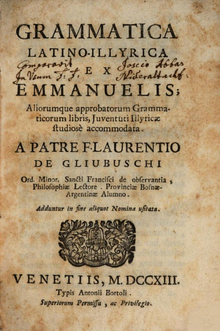Lovro Šitović
Šitović was a native of Ljubuški in Ottoman Herzegovina; he was born into a Muslim family and converted to Catholicism at a young age.
Besides publishing Latin grammar texts, Šitović was a popular author whose works were widely read by Catholics, especially those in Bosnia and Herzegovina.
During the war, Christian hajduks from the Venetian Dalmatia intruded into and plundered the adjacent Herzegovinian and Bosnian areas.
In 1720, Šitović was awarded the title of general lector and honorary definitor (assistant) of the Franciscan Province of Bosnia.
To reward him, Sebastiano Mocenigo, the provveditore general of Dalmatia, gave land near Sinj to Šitović's brother's wife and nephew, who had converted to Christianity.
Along with Jesuit Ardelio Della Bella, Šitović is considered to have been one of the greatest preachers of the time in southern Croatia.
[19] Šitović and Babić used Croatian as a metalanguage for the grammatical narrative when adapting Latin grammar into other languages; this is recognised as a significant innovation.
[22] Explaining his motivation for writing the grammar, Šitović wrote: My dear and lovely reader, do not be surprised at this effort of mine, even if it is a small one, because when you understand the reason: ...
Even though some grammar teachers [referring to Babić][23] have translated the declensions of names and conjugations of Croatian verbs ...[24]Grammatica Latino-Illyrica had two more editions, which were published in 1742 and 1781.
[30] Slobodan Prosperov Novak characterised Pisna od pakla as a "vulgarised Divine Comedy" that was easily accessible to people "in Bosnian backwoods".

